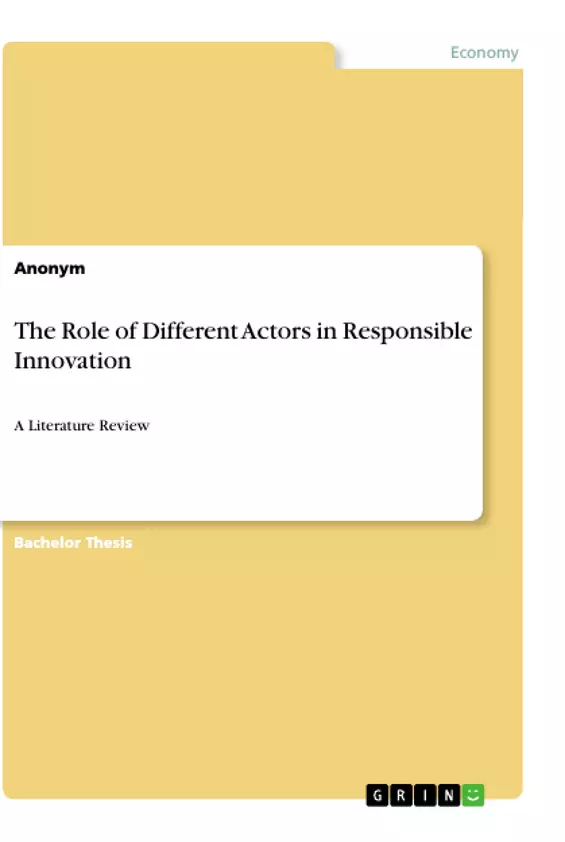
The Role of Different Actors in Responsible Innovation
Bachelorarbeit, 2020
27 Seiten, Note: 1,0
Leseprobe
Inhaltsverzeichnis (Table of Contents)
- Abstract
- Introduction
- Practical Relevance
- Theoretical Relevance
- Theoretical Foundation
- Definitions
- Characteristics of Responsible Innovation
- Dimensions of Responsible Innovation
- Literature Research Strategy
- The Role of Different Actors in Responsible Innovation
- Business Sector
- Manager or Leader
- Business Organizations
- Research Sector
- Universities
- Scientists or Researchers as Innovators
- Public and Civil Sector
- Individuals as civil society and consumers
- Non-Governmental Organizations (NGOs) and Unions
- Governments and Regulative Authorities
- Discussion
- Practical Evaluation
- Theoretical Evaluation
- Limitations and Future Research
- Conclusion
- References
Zielsetzung und Themenschwerpunkte (Objectives and Key Themes)
This study examines the role of different actors in responsible innovation, aiming to synthesize existing literature and analyze their scope of action and participation in this crucial field. The research focuses on three groups: the business sector, the research sector, and the public sector, investigating each actor's influence and potential for collaboration in fostering responsible innovation.
- The importance of responsible innovation in addressing societal and environmental challenges
- The role of different actors in promoting and implementing responsible innovation
- The impact of innovations on different stakeholders and the need for balancing economic, social, and environmental considerations
- The challenges and opportunities associated with fostering collaboration among different actors in the innovation process
- The theoretical frameworks and empirical evidence related to responsible innovation
Zusammenfassung der Kapitel (Chapter Summaries)
The introduction establishes the practical and theoretical relevance of responsible innovation, highlighting the need for a more sustainable and responsible approach to innovation to address pressing global challenges. It emphasizes the importance of engaging various stakeholders in the innovation process to mitigate potential risks and ensure equitable access to its benefits.
Chapter 2 delves into the theoretical foundation of responsible innovation, defining key concepts and outlining its characteristics and dimensions. It explores the various aspects of responsible innovation, including ethical considerations, social responsibility, and environmental sustainability.
Chapter 3 outlines the research methodology employed in the study, providing details on the literature review process and the selection criteria for relevant research papers.
Chapter 4 analyzes the role of different actors in responsible innovation, focusing on the business sector (managers and business organizations), the research sector (universities and scientists), and the public and civil sector (individuals, NGOs, and governments). It investigates the specific contributions and challenges faced by each group in promoting responsible innovation.
Chapter 5 discusses the findings of the study, providing a practical and theoretical evaluation of the role of different actors in responsible innovation. It examines the power and influence of each actor, analyzes the possibilities for collaboration, and offers a theoretical interpretation of the reviewed literature.
Schlüsselwörter (Keywords)
Responsible innovation, sustainability, stakeholder engagement, business sector, research sector, public sector, collaboration, theoretical frameworks, empirical evidence, societal challenges, environmental impact, ethical considerations.
Frequently Asked Questions
What is "Responsible Innovation"?
It is an approach to innovation that integrates sustainability, ethical considerations, and social responsibility to address grand societal and environmental challenges.
Which actors are involved in responsible innovation?
The study identifies three main sectors: Business (Managers, Organizations), Research (Universities, Scientists), and the Public Sector (Government, NGOs, Civil Society).
What is the role of the business sector in this process?
Managers and business organizations are responsible for implementing ethical practices and balancing economic goals with societal impacts.
How can the public sector participate in innovation?
Individuals as consumers and civil society, along with NGOs and governments, act as regulators and stakeholders who demand transparency and accountability.
Why is collaboration among different actors necessary?
Collaborations help mitigate the uncertainty of innovation impacts and ensure that environmental and social risks are managed collectively.
Details
- Titel
- The Role of Different Actors in Responsible Innovation
- Untertitel
- A Literature Review
- Hochschule
- Ludwig-Maximilians-Universität München
- Note
- 1,0
- Autor
- Anonym (Autor:in)
- Erscheinungsjahr
- 2020
- Seiten
- 27
- Katalognummer
- V981284
- ISBN (eBook)
- 9783346335982
- ISBN (Buch)
- 9783346335999
- Sprache
- Englisch
- Schlagworte
- Responsible Innovation Responsible Innovation Literature Literature Review Actors Characteristics Dimensions Business Sector Manager Organizations Research Universities Scientists researchers NGOs Public Individuals Governments Regulative Authorities civil sector
- Produktsicherheit
- GRIN Publishing GmbH
- Preis (Ebook)
- US$ 17,99
- Preis (Book)
- US$ 19,99
- Arbeit zitieren
- Anonym (Autor:in), 2020, The Role of Different Actors in Responsible Innovation, München, Page::Imprint:: GRINVerlagOHG, https://www.diplomarbeiten24.de/document/981284
- Autor werden
- Ihre Optionen
- Vertriebskanäle
- Premium Services
- Autorenprofil
- Textarten und Formate
- Services für Verlage, Hochschulen, Unternehmen

- © GRIN Publishing GmbH.
- Alle Inhalte urheberrechtlich geschützt. Kopieren und verbreiten untersagt.
- info@grin.com
- AGB
- Open Publishing
Der GRIN Verlag hat sich seit 1998 auf die Veröffentlichung akademischer eBooks und Bücher spezialisiert. Der GRIN Verlag steht damit als erstes Unternehmen für User Generated Quality Content. Die Verlagsseiten GRIN.com, Hausarbeiten.de und Diplomarbeiten24 bieten für Hochschullehrer, Absolventen und Studenten die ideale Plattform, wissenschaftliche Texte wie Hausarbeiten, Referate, Bachelorarbeiten, Masterarbeiten, Diplomarbeiten, Dissertationen und wissenschaftliche Aufsätze einem breiten Publikum zu präsentieren.
Kostenfreie Veröffentlichung: Hausarbeit, Bachelorarbeit, Diplomarbeit, Dissertation, Masterarbeit, Interpretation oder Referat jetzt veröffentlichen!
- GRIN Verlag GmbH
-
- Nymphenburger Str. 86
- 80636
- Munich, Deutschland
- +49 89-550559-0
- +49 89-550559-10
- info@grin.com
-









